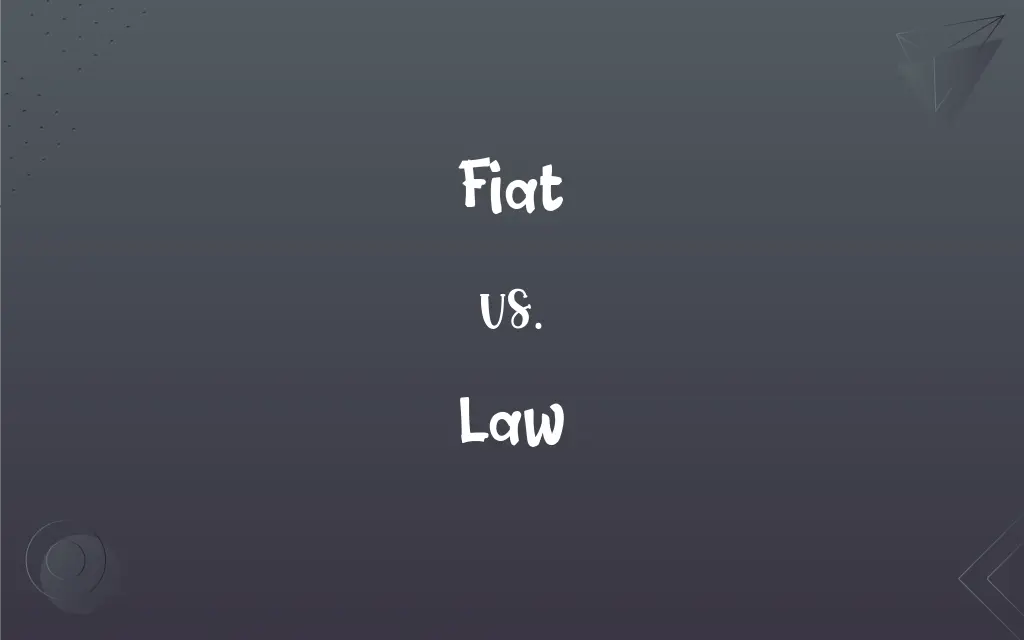Fiat vs. Law: What's the Difference?
Edited by Janet White || By Harlon Moss || Updated on November 2, 2023
Fiat is an authoritative decree, order, or authorization, while law is a system of rules created and enforced through social or governmental institutions to regulate behavior.

Key Differences
Fiat emanates from a position of authority and represents a command, often without consultation, whereas a law is typically the result of a legislative process and reflects the collective agreement or principles of governance.
Fiat can be arbitrary, a decision made by a single entity or leader, while laws are formed through debate, consensus, or democratic voting, embodying the collective will and societal norms.
A fiat is immediate, with the authority's will imposed and expected to be followed forthwith; a law, however, often undergoes scrutiny, amendments, and ratification before it takes effect.
The term fiat often carries a connotation of absoluteness and is not necessarily bound by legalities, unlike a law, which is structured within the confines of justice and legality.
Fiat may not require legal backing to be enforced within its jurisdiction, contrasting with a law that is upheld by the legal system and subject to judicial review.
ADVERTISEMENT
Comparison Chart
Nature
Authoritative decree, order, or permission.
Set of rules developed through legislation.
Source
Single authority (e.g., monarch, ruler).
Governmental or legislative body.
Flexibility
May be arbitrary or unconditional.
Subject to legal frameworks and principles.
Legitimacy
Derived from authority's power.
Established by legal and democratic processes.
Enforcement
Immediate and absolute within its scope.
Subject to interpretation and enforcement mechanisms.
ADVERTISEMENT
Fiat and Law Definitions
Fiat
A decree or sanction.
The corporate fiat changed the company's direction overnight.
Law
A statement of fact, deduced from observation, to the effect that a particular natural or scientific phenomenon always occurs if certain conditions are present.
Newton's law of universal gravitation is taught in physics.
Fiat
A formal authorization or proposition.
The government issued a fiat to legalize the new currency.
Law
The police force, viewed as enforcers of the law.
She called the law when she heard a disturbance outside her house.
Fiat
An order issued by legal authority.
The fiat to cease operations was unexpected.
Law
The body of divine commandments as expressed in the Bible or other religious texts.
According to the law of Moses, certain foods are considered unclean.
Fiat
An official order given by someone with authority.
The king's fiat was to build a new palace.
Law
An individual rule as part of a system of law.
The new traffic law increased the penalties for speeding.
Fiat
An arbitrary order or decree.
Law
A system of rules recognized by a country or community.
He studied the law to become an attorney.
Fiat
Authorization or sanction
Government fiat.
Law
A rule of conduct or procedure established by custom, agreement, or authority.
Law
The body of rules and principles governing the affairs of a community and enforced by a political authority; a legal system
International law.
FAQs
Does a fiat require justification?
Not necessarily, as it's based on authority, not always on reason.
Are laws subject to interpretation?
Yes, laws often require interpretation by judges or courts.
Can anyone issue a fiat?
Only someone with the requisite authority can issue a fiat.
Is following the law optional?
No, adherence to the law is mandatory under legal systems.
Does fiat mean the same as dictatorship?
Not exactly; a fiat is an order by any authority, not just a dictator.
Can a fiat be overturned?
Yes, by the issuing authority or a superior authority.
Do laws change?
Yes, laws can be amended or repealed over time.
Can laws be unjust?
Yes, historically there have been laws considered unjust by today's standards.
Are laws applicable to everyone?
In principle, yes, but application can vary based on jurisdiction.
Are all laws created by fiats?
No, laws are created through legislative processes, not just by fiat.
Do all societies have laws?
All societies have some form of rules that function as laws.
Are laws always fair?
Ideally, but not always in practice; fairness is subjective.
Can a company issue a fiat?
Yes, in the context of corporate directives.
Do fiats have checks and balances?
Often, no; fiats are less likely to have checks compared to laws.
Are laws always written down?
Most formal laws are, but some customary laws may not be.
Can a fiat be democratic?
Fiats are typically top-down and not democratic.
What's an example of a fiat currency?
The U.S. dollar is a fiat currency, not backed by physical commodities.
How are laws enforced?
Through judicial systems and law enforcement agencies.
Can a fiat create a law?
In some systems, a fiat may have the power to establish laws.
Is a fiat legally binding?
Within its jurisdiction, it can be as binding as a law.
About Author
Written by
Harlon MossHarlon is a seasoned quality moderator and accomplished content writer for Difference Wiki. An alumnus of the prestigious University of California, he earned his degree in Computer Science. Leveraging his academic background, Harlon brings a meticulous and informed perspective to his work, ensuring content accuracy and excellence.
Edited by
Janet WhiteJanet White has been an esteemed writer and blogger for Difference Wiki. Holding a Master's degree in Science and Medical Journalism from the prestigious Boston University, she has consistently demonstrated her expertise and passion for her field. When she's not immersed in her work, Janet relishes her time exercising, delving into a good book, and cherishing moments with friends and family.































































